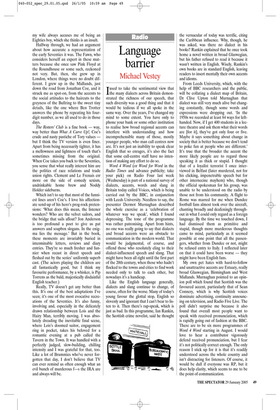Language barrier
Michael Vestey
Iused to take the sentimental view that the many dialects across Britain demonstrated the richness of our speech, that such diversity was a good thing and that it would be tedious if we all spoke in the same way. Over the years, I’ve changed my mind to some extent. You have only to phone your bank or some other institution to realise how broad regional accents can interfere with understanding and how incomprehensible many of those, mostly younger people, who man call centres now are. It’s not just an inability to speak clear English that so enrages, it’s also the fact that some call-centre staff have no intention of making any effort to do so.
Word 4 Word (or Word for Word in the Radio Times and advance publicity; take your pick) on Radio Four last week (Wednesday) is part of a national survey of dialects, accents, words and slang in Britain today called Voices, which is being carried out by the BBC, in conjunction with Leeds University. Needless to say, the presenter Dermot Murnaghan described the whole exercise as a ‘celebration of whatever way we speak’, which I found depressing. The tone of the programme was rather patronising. Apart from hints, no one was really going to say that dialects and broad accents were an obstacle to communication in the modern world. That would be judgmental, of course, and offend those who resolutely cling to their dialect-influenced speech and slang. That might have been all right until the first part of the 20th century, when those who hadn’t flocked to the towns and cities to find work needed only to talk to each other, but nowadays it’s a handicap.
Like the English language generally, dialects and slang continue to change, of course, often for the worse. Many of today’s young favour the glottal stop, English so slovenly and ignorant that I can’t bear to listen to it. Then there’s rap-speak, which is just as bad. In this programme, Ian Rankin, the Scottish crime novelist, said he thought the vernacular of today was terrific, citing the Caribbean influence. Why, though, he was asked, was there no dialect in his books? Rankin explained that he once took home a novel written in broad Glaswegian, but his father refused to read it because it wasn’t written in English. Wisely, Rankin’s own books are in standard English, leaving readers to insert mentally their own accents and idioms.
From Leeds University, which, with the help of BBC researchers and the public, will be collating a dialect map of Britain, Dr Clive Upton told Murnaghan that dialect was still very much alive but changing constantly, though some words and expressions were dropping out. ‘In the 1950s we recorded at least 84 ways for lefthanded. Now, if I get 400 students in a lecture theatre and ask them what their words are [for it], they’ve got only four or five. Maybe it says something about change in society that is better because we don’t tend to poke fun at people who are different.’ It’s true that the broader the accent the more likely people are to regard those speaking it as thick or stupid. I thought that of a loyalist terrorist I once interviewed in Belfast (later murdered, not for his clicking, impenetrable speech but for other internecine mayhem) who, though the official spokesman for his group, was unable to be understood on the radio by those not from his community. A flight to Rome was marred for me when Dundee football fans almost took over the aircraft, chanting broadly and deafeningly throughout in what I could only regard as a foreign language. By the time we touched down, I had dismissed them as primitive and stupid, though more murderous thoughts came to mind, particularly as it seemed possible at one point that all the passengers, whether from Dundee or not, might be refused entry to Italy. I reflected later on that it could have been worse — they might have been English fans.
My own pet hates with hard-to-follow and unattractive accents are Estuary, really broad Glaswegian, Birmingham and West Midlands. Murnaghan pointed to an opinion poll which found that Scottish was the favoured accent, particularly that of Sean Connery, which is why Scottish voices dominate advertising, continuity announcing on television, and Radio Five Live. The poll didn’t surprise me because it also found that overall most people want to speak with received pronunciation, which is rapidly going out of fashion at the BBC. There are to be six more programmes of Word 4 Word starting in August. I would love to hear a contributor vigorously defend received pronunciation, but I fear it’s not politically correct enough. The only reason I stick up for it is that it’s readily understood across the whole country and isn’t distracting for listeners. Of course, it would be dull if everyone was RP, but it does help clarity, which seems to me to be the point of communication.















































 Previous page
Previous page